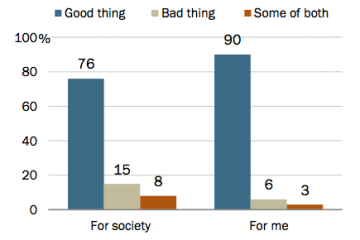On March 12, 1989, Sir Tim Berners-Lee, a British computer scientist, wrote a paper that outlined the architecture of what we would come to know as the World Wide Web. That date was almost 25 years ago, and to mark the anniversary, the Pew Research Center has released a report on what the Internet means to us today.
Pew surveyed 1,006 adults in the U.S. and asked them how important the Internet was to their daily lives. Has the Internet been a positive force in society, beyond creating LOLcats and Bitcoin? The almost unanimous answer is that it has. Thanks, Tim!
Here are some of the survey’s more surprising findings, as illustrated in the graphs above.
- In 1995, only 14 percent of American adults used the Internet, while 87 percent do today.
- 76 percent of Internet users think it has been good for society, while 90 percent think it’s been a good thing for themselves.
- 53 percent of users in 2014 think it would be “very hard” to give up Internet, while only 34 percent say TV would be hard to give up.
- 76 percent of Internet users think the Internet is “mostly kind”
Clearly, most of the Internet has never been to 4chan.











